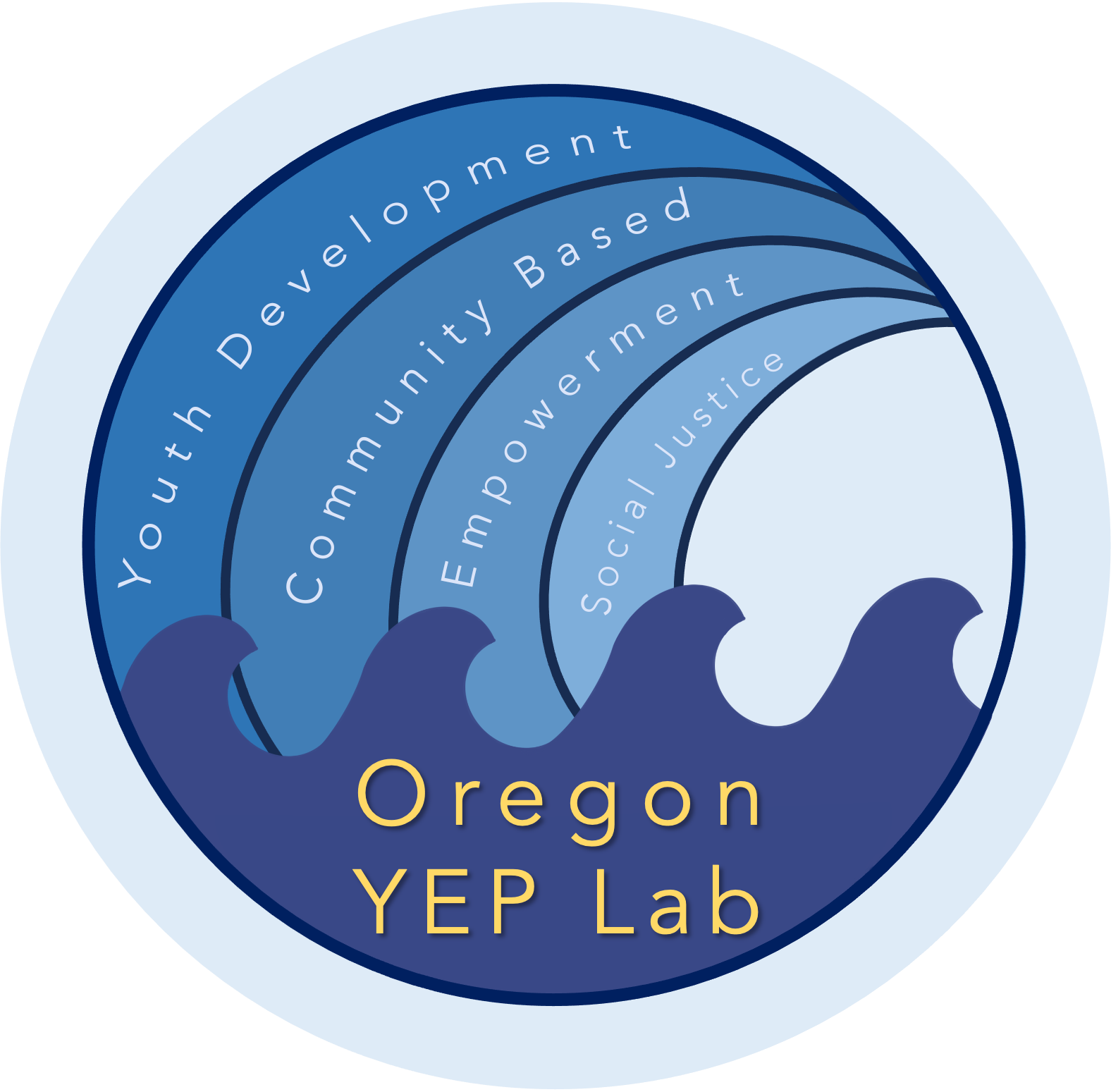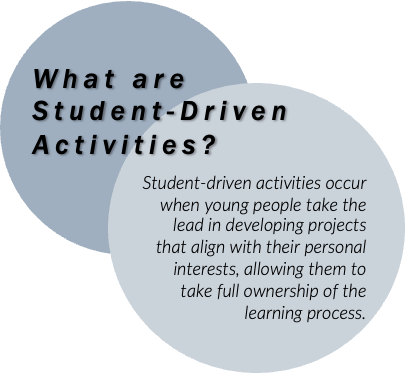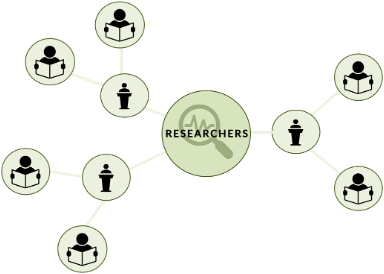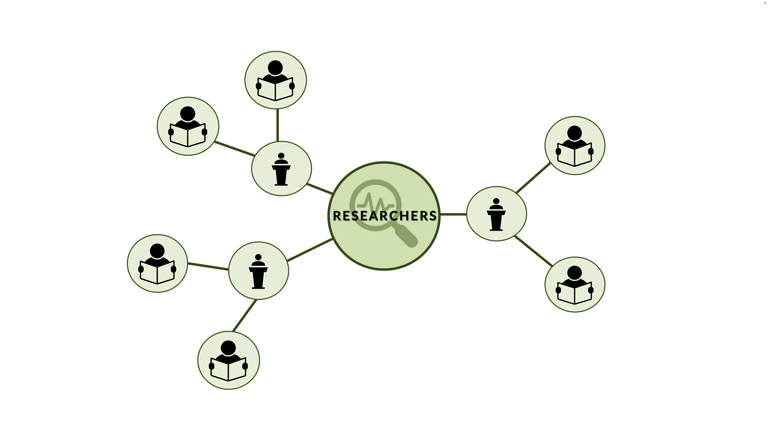Mapping the Civics Landscape Toolkit
Purpose
Our toolkit provides educators connections to vetted materials for teaching high-impact civics.

Explore
Browse our library to find a resource that meets your needs. Click on any topic bubble to begin.
Importance of Civics Education
Civics education is critical to the next generation! Research indicates that students gain valuable skills and self-confidence from civics education programming within schools and community settings.

Key Developmental Benefits of Civics Education for Students
Beyond the individual student, civics education programming supports active, engaged, and informed participation in our communities and society at-large.
For more information, click here to access an open access chapter, which unpacks the various benefits of civics education at multiple levels (see Figure 15.3).
Ecological Model Figure: Here, we highlight the various levels and contexts in which civics education has been found to benefit individual students, schools, and the larger community.
Resources
The following resources may be helpful when advocating for civics education in your school and/or community:
Evidence-Based Curriculum
1
When looking for civics education programming, it is important to consider whether the curriculum is evidence-based. Click here to learn more about why this is important.
2
Click below to access resources on understanding evidence-based curriculum.
The following steps show how to develop evidence-based curriculum:

Who can help you find evidence-based curriculum?
Brokers are individuals or organizations who connect educators to civics curriculum and professional development opportunities. Educators can form relationships with brokers through school district officials, local organizations, and teachers. In some cases, honest and trusted brokers can connect educators to evidence-based curriculum and informational resources.
Some important things to keep in mind when building relationships with brokers is to evaluate the alignment of their values and goals with your own educational objectives. Brokers come with varying ideologies, views, expertise, and rigor in ensuring the research they are sharing is credible.
Additional resources for understanding evidence-based curriculum:
Evidence-Based Curriculum:
Implementing Civics Education
You are sold on the importance of civics education. But what are the ways you can advocate for civic learning in your school and community?
Drawing from interviews with over 80 administrators, educators, and community organizers, we have identified key strategies for advocating for and implementing civics programming within your school community.
Key strategies for implementing civics education:
Tying Civics Education to Your State Standards
One strategy for implementing civics education is ensuring the curriculum and learning goals are in alignment with your state’s standards.
Teacher with 8 years of experience, U.S. History
Oregon
I think that I do have to be like careful and conscious about the like, ’what I put forward’ because politics plays a role. We're in a small rural town where you have to be aware of things… I've been protected from it at the administration level…if there are parental complaints, the validity of them has to be checked…what I cover is definitely within our state standards and our state standards are pretty clear.
Resources
Engaging with Parents and the Community
One strategy for implementing civics education is encouraging transparent and reciprocal family and community involvement within the classroom. Educators stress the importance of transparency when discussing civic initiatives and programming with families. Below are resources that further elucidate the importance of family and community involvement, as well as tools for building such relationships.
Director of Curriculum with 33 years of experience
New Jersey
Uniquely, not only have I worked here, starting my 33rd year, I went through this school system, I live in this town and my two children went through. So I have a very different relationship with the community in the sense that I have a level of trust with the community that maybe not every director of curriculum has. So when it came time for the health and I knew how upset people were, that's why I went to them. One of my mentors very early on said, “if there's a problem brewing, go to the problem before the problem comes to you.” When I read the standards, some of it, I was like, “why did they word it like that? People are going to say this”….We have 5 elementary schools, and I literally did five nights out that week where I just hit each school. I tried to do one in the afternoon for working parents. So you could attend any session and then I just said to them, “listen, I wanted to be here to answer your questions. I wanted to look you in the eye and you hear from me”, you know, “stop reading the headlines, stop reading the newspaper articles, all of our curriculum documents are posted online. So any parent can go online and see it.” I said “we put links in, and videos, whatever. It's all there for your review. If you have concerns, reach out, give me the chance to explain our rationale.
Resources
Using Terms That Spark Interest Rather Than Outrage
Educators successful in advocating for and implementing high impact civics education are consciousness of the language they use with the communities they engage with.
Civics Education Coach with 15 years of experience
Illinois
In Chicago I might talk about civic action. No problem. When I go downstate I talk about: Hey, we have to help kids see themselves as ‘we the people’ and their role in creating a more perfect union. No quoting the Constitution. Am I saying same thing? Absolutely. Language that resonates with them…that helps sort of navigate the waters. It's also listening to understand instead of to immediately respond.
Resources
Supporting Student-Driven Activities

The basic premise of student-driven learning involves:
- Problem definition (students select an issue that they care about).
- Data collection (students systematically gather local information and vetted research to better understand the issue).
- Data analysis (students analyze the information they have gathered as well as the research on such an issue).
- Social action in which students use the systematic research they have gathered to advocate for programs, policies or needed resources).
All of these activities are done in supportive partnership with educators.
One strategy for implementing civics education is facilitating student-driven activities within the classroom. Interviews have highlighted how student-driven activities are backed by research evidence, as well as an effective strategy for protecting educators from potential backlash (as students select the topics). Below is a list of civics education resources that highlight various student driven approaches.
Teacher with 22 years of experience, U.S. History
Texas
We worked with seventh graders who were reaching out to local, like, city council members, and, like, having these conversations. Consistently, what we got back in our feedback was that people could not believe that they were talking to seventh grader. That they were so articulate. That they were organized. That they had a very clear plan…These seventh graders, they were, like, astounded by the fact that people were listening to them, and they were having this impact. And it was really, like, deep issue that they had decided to focus on which was domestic violence, but particularly in immigrant populations who are afraid to report that and how do we like go about getting that support for them? And they were trying to advocate for the passage of a bill through the Texas Senate. It was a lot a lot of work that they were doing and connecting with different Congressmen who were going to be able to, like, have that voice. I was blown away. It felt for the first time, like, I was doing really what I was supposed to be doing as a teacher, right? That, like, I wasn't just teaching them the history and teaching about the change makers, like, I was creating change makers…It's a lot of, right now trying to back it into our curriculum in ways that we're not gonna get like red flagged…We’re just trying to be really thoughtful and protective of the people in our department but making sure that our students are getting these ideas and concepts.
Resources
Building Networks
Building a diverse network in your community can be beneficial for gaining support and access to evidence-based curriculum to teach civics education in politically tense environments.

There is a gap between what is being researched and what is getting into the hands of teachers.
In this visual, you can see that some teachers have access to researchers and resources, while others are more disconnected.
Those with limited connections are often underfunded school districts, as well as rural school districts that have to navigate great physical distance to access professional support and resources.

One of the aims of this project is to focus on who teachers are going to for evidence-based curriculum.
Across our interviews, we have systematically seen the value of networks and key brokers (non-profits, university centers, state departments) in helping educators to access and implement evidence-based curriculum. Below are some resources that may help inform the development of your own network.

